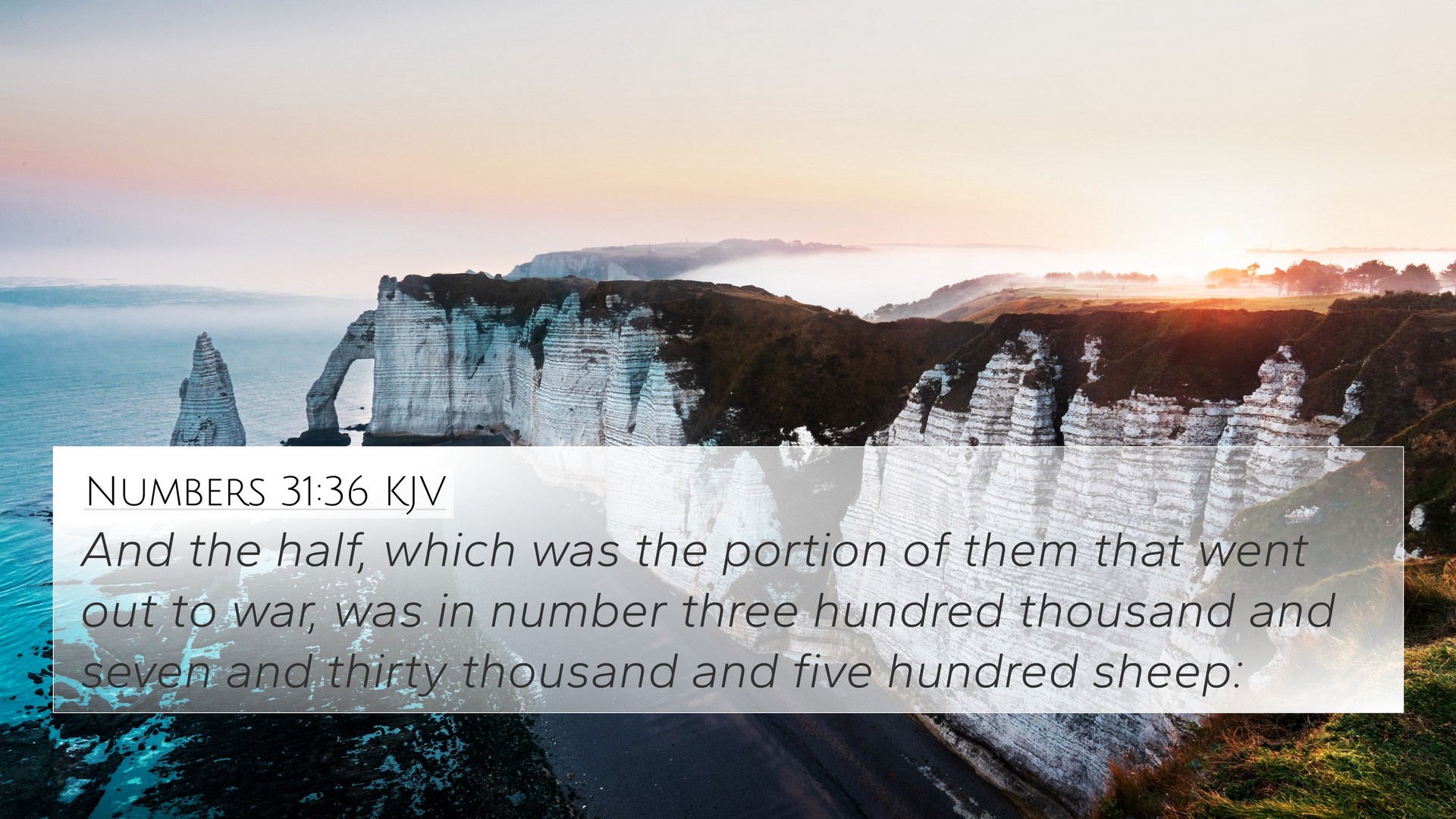Understanding Numbers 31:36
Bible Verse: Numbers 31:36 - "And the half, which was the portion of the congregation, was three hundred and thirty-seven thousand and five hundred sheep."
Overview and Context
The verse comes from a passage that describes the division of spoils taken after a battle against the Midianites. This account highlights the allocation of resources among the various tribes of Israel.
Interpretation from Commentaries
Matthew Henry's Commentary
Matthew Henry emphasizes the significance of God's providence in the division of spoils. He notes that the detailed account of the wealth recovered demonstrates God's blessing upon Israel and the care for equitable distribution. Henry further explains that the enumeration of the spoils serves to remind the people of God's faithfulness, as even in victory, they acknowledge His hand at work.
Albert Barnes' Notes
Albert Barnes focuses on the practical implications of the spoils' division mentioned in this verse. He points out that the mention of the number of sheep reflects not only the prosperity that came from the victory but also the responsibility that comes with it. Financial resources in biblical times were often viewed as a test of stewardship and gratitude to God for his provision.
Adam Clarke's Commentary
Adam Clarke provides a linguistic insight into the figures mentioned, suggesting that these numbers were significant in showing the extent of God's favor towards the Israelites after their conflict with Midian. Clarke also posits that such numerical details create a rich tapestry of gratitude and acknowledgment of divine assistance in warfare.
Key Themes
This verse is intertwined with several themes, including:
- Divine Providence: Recognizing God’s hand in both victories and blessings.
- Community and Sharing: The importance of equitable distribution among the tribes.
- Gratitude and Stewardship: Understanding resources as divine gifts to be managed wisely.
Bible Verse Cross-References
This verse connects with several other scriptures, enhancing our understanding of its implications:
- Exodus 15:3-4: God is recognized as a warrior defending His people.
- Joshua 22:8: The sharing of spoils highlights community responsibilities post-battle.
- 1 Chronicles 20:4-8: Additional accounts of battles and divine victory.
- Psalms 44:3: Reflects on the notion of possession as God’s gifts.
- Matthew 25:14-30: The parable of stewards parallels the stewardship of resources.
- Luke 16:10: Faithfulness in little things connects with management of spoils.
- 1 Timothy 6:17-19: A call for rich individuals to be generous as they acknowledge God’s providence.
Connections Between Bible Verses
In examining the surrounding passages, we see significant thematic connections:
- Linking Exodus and Numbers: Both books discuss God’s deliverance and provisions in battle.
-
- Comparisons with Deuteronomy 20:14, which discusses spoils after conquest, stressing moral considerations regarding them.
- Connections to the New Testament, particularly in understanding resources as tests of faithfulness.
Thematic Bible Verse Connections
Understanding Numbers 31:36 also opens discussions on broader themes:
- War and Provision: Themes in Isaiah 40:10 and Revelation 19:11 regarding divine justice in warfare.
- Equity in Distribution: Relevant to teachings in Acts 4:32-35 where communal sharing is emphasized in the early church.
- Victory in the Lord: Reflections in Romans 8:37 where believers are described as more than conquerors.
Cross-Referencing Biblical Texts
Using cross-references, scholars and theologians create a robust understanding of scripture. This verse illustrates how, within the narrative of victory, community responsibilities and God’s providence are highlighted.
Utilizing cross-referencing tools allows for a comprehensive study that enriches our understanding of interconnected biblical texts.
Conclusion
In conclusion, Numbers 31:36 provides deep insights not only into the history of Israel's battles but also into larger theological themes such as stewardship, divine provision, and community responsibility. The connections made through various cross-references with other biblical texts further illuminate its significance. Engaging deeply with these themes can yield greater spiritual understanding and encourage more profound study through resources that assist in cross-referencing biblical texts.


